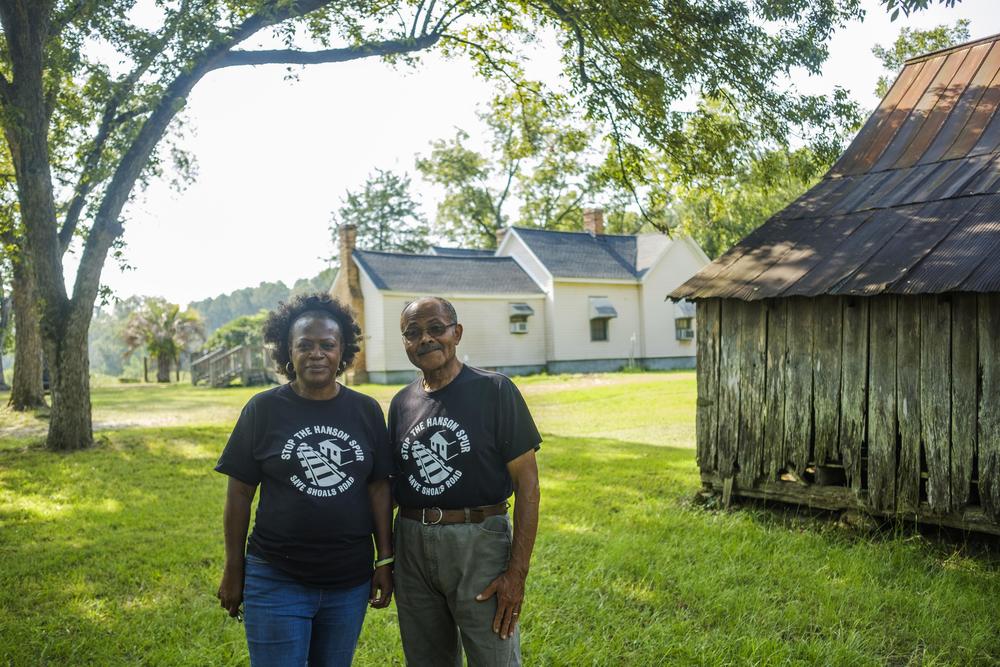
Caption
Jan and Mark Smith stand near the home where Mark was raised, in the background, and the barn his grandfather built in 1926, right.
Credit: Grant Blankenship / GPB News
|Updated: August 31, 2023 4:18 PM
Imagine your family land has fed generations and paved the way for educating not only you, but your children, too.
Now imagine that a business says they will take some of your family land, in the name of commerce and economic development.
What do you do?
Mark Smith had been wrestling with the implications of the question as a real-life scenario for over a year.
On a hot day in early August, he was in his kitchen shelling the field peas he'd been picking earlier in the morning outside his home on the hill above Shoals Road in Hancock County, about halfway between Macon and Augusta.
On the kitchen table was a big bowl of freshly picked and shelled peas. Purple hull peas to be exact, one of the ephemeral summer delicacies from Southern gardens.
“That’s a bushel right there,” Smith said.

Jan and Mark Smith stand near the home where Mark was raised, in the background, and the barn his grandfather built in 1926, right.
Walk back out the kitchen door, through a fence gate and a small pecan orchard and you arrive at another house — smaller and older.
“That's my dad's house,” Smith said. “But that's where I grew up. And I stayed in til I was 17.”
A military career followed, and marriage to his wife, Jan. When Jan’s time in the military ended, too, the Smiths could have lived anywhere. They chose Shoals Road.
“And we've been here ever since. And it's been 32 years ago,” Smith said.
The Smiths chose to return home to this land because of how his father used it as an engine for educating Mark and his siblings and launching them into the wider world.
“This property is important to us," Smith said. "It's been our generational wealth. You know, we've been able to use this to make our family better — educationally, financially, all of those things."
All of which makes what the Sandersville Railroad wants to do with Georgia properties like those belonging to Mark Smith’s family and their neighbors so hard to understand.
“Why does anybody think that they could just come along and run a railroad cross and tell you what they're going to do with it?”
If that happens, it will be because the Sandersville Railroad will have convinced state regulators that their aims are aligned with the needs of one of the most economically distressed counties in the state.
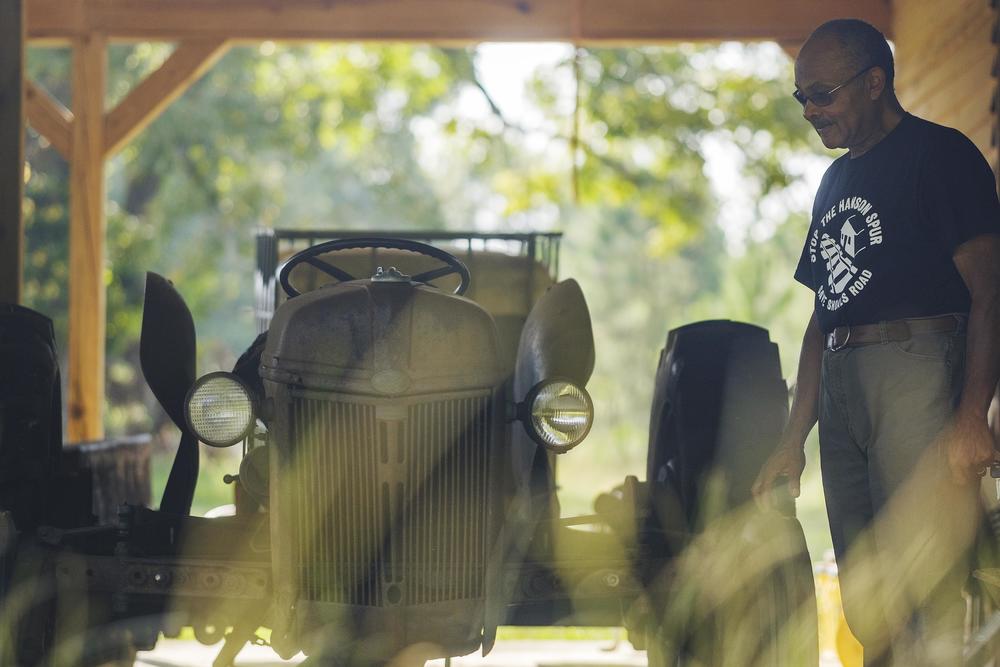
Mark Smith stands by the 1948 Ford tractor which belonged to his grandfather and with which he still farms today.
Mark and Jan Smith both taught school once they set down roots again in Hancock County. Now that they are retired, Jan writes for the local newspaper, the Sparta Ishmaelite, and sometimes for the religious publication Guideposts.
Mark farms, working the same land his grandfather did almost 100 years ago.
“My grandfather bought this place in 1926,” he said. “You're talking about Jim Crow during that time, the Depression. And here was a Black man, and I think they wanted $2,500 for it. He didn't have 2,500 bucks.”
But he could farm. So instead of handing the white family who sold him the land what works out to about $43,000 in today’s money, Mark’s grandfather paid in cotton. He passed the land onto Mark’s father.
“He used it," Mark Smith said. "He grew trees on it. He traded trees for tuition. He had cows. He sold cows for tuition. He grew vegetables, just like I'm doing now, for tuition. He paid for all of that with this land.”
That meant six advanced degrees, one for Mark and each of his five siblings — a kind of upward mobility still rare for Black families in this part of the South. Mark and Jan Smith sent their three sons to college, too.
What they perceive as a threat to this history first came in the mailbox. Jan Smith still keeps it and other documents in a series of manila folders.
On Sandersville Railroad letterhead, it begins:
"I am sending you this letter because some of your property will be required as a right of way for the new project."

Sally and Don Garrett stand on their porch. Sally and neighbor Jan Smith often protest the Sandersville Railroad plan with other residents.
Walk across properties belonging to others in the Smith family and you will find Sally and Don Garrett’s place. It was Don’s grandfather who sold land to Mark Smith’s grandfather. And like the Smiths, Don Garrett has a long list of the things his family endured from this place.
“Two world wars, a 1918 flu epidemic, a depression, a Korean War, Vietnam War, that we sent people out to fight,” Garrett said.
Today, the house he grew up in belongs to his son, a combat veteran who lives in Florida but still comes to the homestead with his own family as a retreat.
The Garretts got the same letter in the mail the Smiths did.
“It said we will require you know, part of your property,” Garrett remembered, drawing out the word: require.
He called the phone number at the bottom and got a woman on the phone.
“And she said basically, well, if you don't sell it to us, we'll use eminent domain to just take it.”
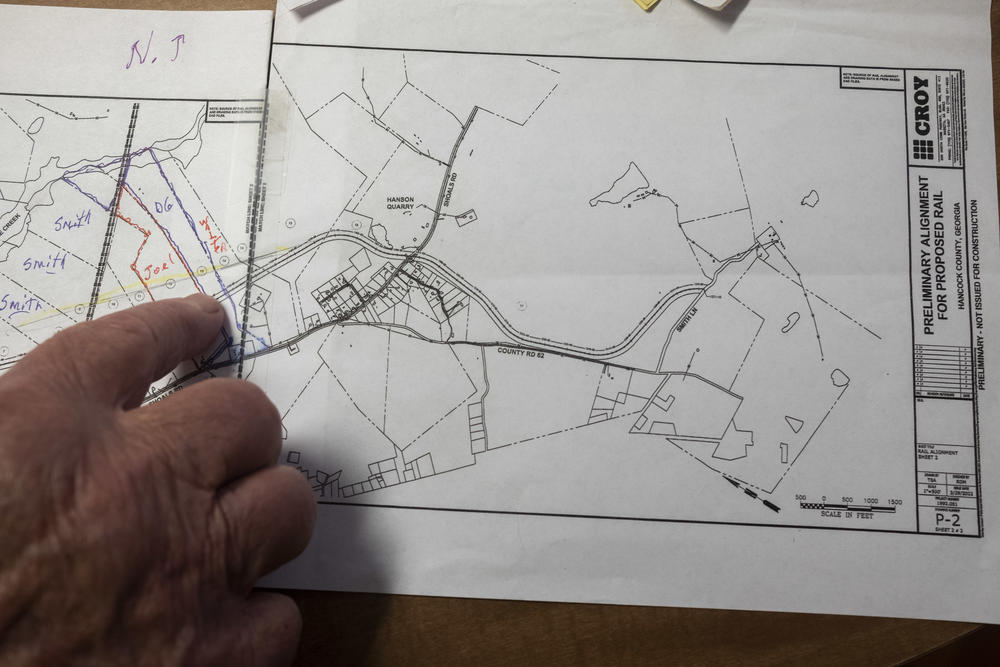
A map of the Shoals Road area and the proposed rail spur. Jan Smith said she's worried most for the neighborhood near the center of the map, homes to which the train would come closest.
Eminent domain is the power granted to government to take private property for public use. In Georgia, it’s used by public utilities like power companies or the state agency that builds highways.
And since railroads are also utilities under state law, they also have the power of eminent domain.
Ben Tarbutton III is the president of the Washington County-based Sandersville Railroad. What he wants to do is build what’s called a short-line railroad to take granite from an already-operating quarry on Shoals Road out to larger regional rail lines, like CSX and Norfolk Southern — and from there, to the world.
“I mean, even though we're a small company, we're a vital part of the national freight network,” Tarbutton said.
That’s because big rail lines can’t get everywhere — or, more precisely, they can’t always go right by the places where some hard-to-reach resources come out of the ground.
“I mean, here in Sandersville, Washington County, you know, we're fortunate to have Kaolin and pine trees,” Tarbutton said.
Kaolin is a white clay used in everything from over-the-counter anti-diarrheal medicine to the glossy coating of high-end magazines. In Georgia it’s mined from a few counties between Macon and Augusta.
“In Hancock County, it’s granite and pine trees,” he said.
And the Hanson Quarry on Shoals Road could continue moving granite by truckload as it does now, or it could move out exponentially more, on a train.
But for that to happen, Tarbutton needs land from the Smiths, the Garretts and a bunch of their neighbors.
“We made an offer,” Tarbutton said. “And that offer is a very competitive market-based offer.”
Don Garrett said he wasn’t too impressed.
“Well, his fair market value isn't too fair, you know,” Garrett said with a laugh.
For one thing, Garrett said the value of his land isn’t about money. It’s about family. In her kitchen, surrounded by the documents that have become a major focus of her life, Jan Smith clearly felt the same.
“You're going to take and run a train, crisscross 600 acres of property that has been in the family for 99 years?” she asked. “If that's not audacity!”
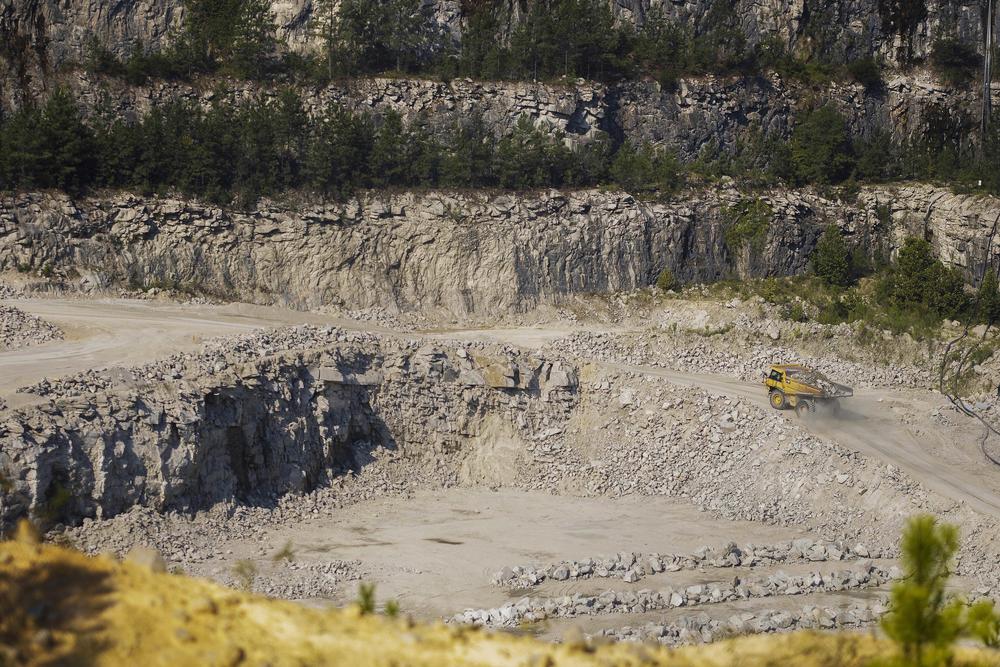
A large dump truck called a yuke carries granite boulders up from the working face of the Heidelberg Materials quarry on Shoals Road in Hancock County.
Mark and Jan Smith have been organizing their neighbors into an opposition which has drawn support from the Southern Poverty Law Center and the Ogeecheee Riverkeeper.
As a result there has been some movement in the rail plan. The most recent version misses Mark and Jan Smith. But it still affects Mark’s brother, Blaine, and other relatives. Blaine doesn’t want to sell, either.
Tarbutton says he’s left with one option.
“I don't want to be in the conversation where we are having to condemn people,” Tarbutton said. “That's not who we are. But if no one talks to me, I don't have a choice.”
But does he have the right? Bill Maurer thinks not.
Maurer is an attorney with the Insititute for Justice, a nonprofit law firm specializing in eminent domain representing Shoals Road residents against the Sandersville Railroad.
“My interpretation of their argument is essentially that being a public utility is like being pregnant: You're either a public utility or you're not,” Maurer said.
Maurer looks at Georgia law and sees something more nuanced.
“You have to be acting as a public utility when you use this power,” he said.
That means providing a public good, something everyone needs or can use, like electricity, drinking water or even a greenway trail.
As Tarbutton the railroad president sees it, he is offering that kind of utility.
“The railroads are providing a service. It's commerce,” he said.
Maurer counters that he just sees a few companies which stand to make a lot of money.
“And that's not a public use,” Maurer said.
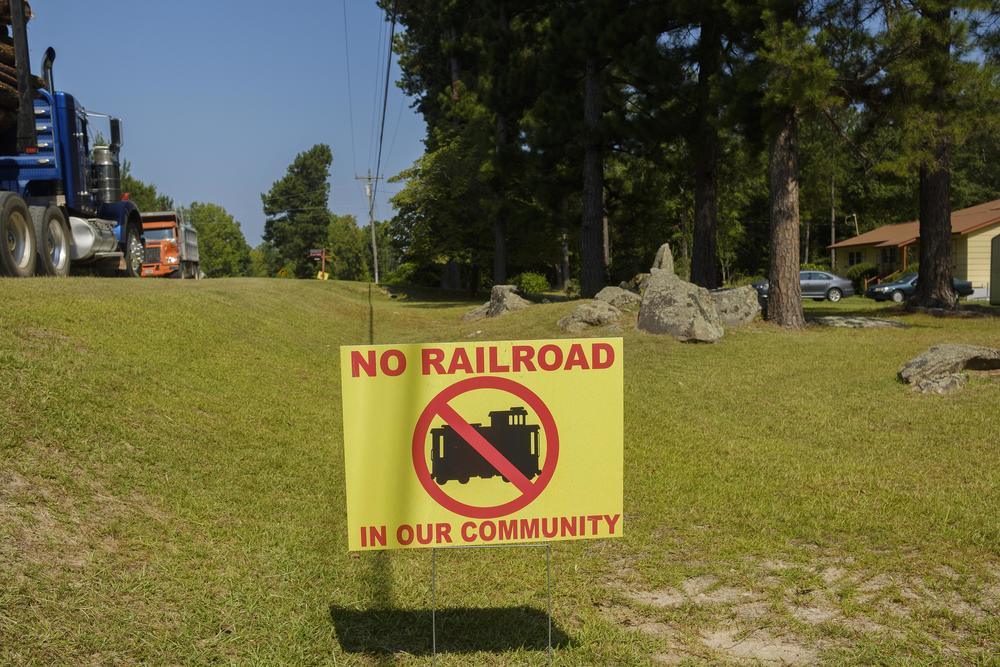
One of a number of signs voicing opposition to the rail spur project along Shoals Road in Hancock County.
Allen Haywood is Head of Industrial Development for Hancock County. He is also the mayor of Sparta, the county seat. He wants the rail spur in what is often cited as the most impoverished county in the state.
“We need the jobs," Haywood said. "We need something to keep the kids here when they graduate.
"We got nothing.”
Tarbutton and the railroad promise at least 12 new jobs with salaries offering a little better than five times the local per capita annual income of $18,000, about $90,000 a year.
What Allen Haywood really hopes is that the rail spur will help him recruit new industry to the area. He is prepared to testify in favor of the project and the use of eminent domain before Georgia’s five-member Public Service Commission, to whom it falls by law to decide the issue. That hearing is scheduled for November.
Meanwhile, from his kitchen where he bagged up field peas, Mark Smith remembered the words of his father.
“Don't give the land away, don't sell it, and don't let anybody take it.”